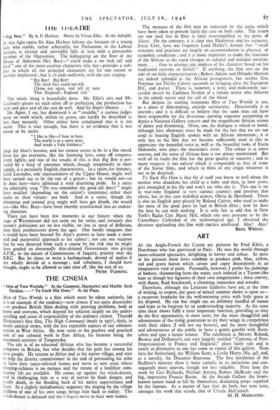HE I t - thA rRE .
" Big Ben." By A. P. Herbert. Music by Vivian Ellis. At the Adelphi.
IN this light opera Sir Alan Herbert follows the fortunes of a young lady who stands, rather arbitrarily, for Parliament . in the Labour interest, is elected and inevitably falls in love with a personable member of the Opposition. The kidnapping on the floor of the House of Alderman -Mrs. Busy—" you'd make a rat look tall and kind " one of the more carefree characters tells her—provides a sub- plot in which all the principal characters are for one reason or another implicated ; but it all ends mellowly, with the cast singing :
" Big Ben! Big Bert!
The clock they could not kill, Chime out again, and tell all men That England's England still."
The whole thing is beautifully done. Mr. Ellis's airs and Mr. Cochran's• graces set each other off to perfection, the production has style and pace and all the cast do well. And Sir Alan's libretto . . .?
Mr. Agate, I see, has dismissed it as " twaddle," a curious judge- ment on work which, within its genre, can hardly be described as less than masterly. Other critics have complained that it is not satire. This is true enough, but there is no evidence that it was meant to be satire.
" I like to like—I hate to hate, The world is in a sorry state, And needs a little kindness," sings Sir Alan's heroine, and her creator seems to be in a like mood. Even his pet aversions, like the licensing laws, come off compara- tively lightly, and one of the results of this is that Big Ben is per- vaded by a kind of tolerance which, though temporarily in short supply, is a peculiarly English characteristic. In a satire, for instance, Lord Lavender, sole representative of the Upper House, might well have turned out to be the son of a grocer ; but he would not—as he does here—have admitted it with disarming pride. In a satire the admirable song " Do you remember the good old days? " might have recalled (depending on the satirist's intentions) either their faults or their virtues: not both. And in a satire, though the obnoxious and teetotal prig might well have got drunk, she would not—like Mrs. Busy=have been thereby transformed into an endear- ing character.
There can have been few moments in our history when the stage of Westminster did not seem set for satire, and certainly this season's politicians are no less risible, no less in need of deflation, than their predecessors down the ages. One hardly imagines that it would have been beyond Sir Alan's powcrs to have made a more acid and purposeful approach to his subject ; nor can one suppose that he was deterred from such a course by the risk that he might have goaded an abnormally thin-skinned Government into giving A.P.H., in the matter of Commissions of Inquiry, priority over the B.B.C. But he chose to write a harlequinade, devoid of malice if not wholly devoid of a message ; and reformers, I should have thought, ought to be allowed to take time off, like the rest of us.
PETER FLEMING.






























 Previous page
Previous page